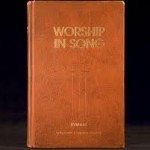 I love to sing songs of praise to God. There are some songs that I consider to be my favorites, and I’m sure you have your favorites as well. Going back, I can’t remember a time when singing hymns weren’t a part of my life. “The Old Rugged Cross“, “We Praise Thee, O God“, “He is My Everything” have been songs I remember singing from an early age. When Vicki and I were married (22 years ago), we had “God Be With You Til We Meet Again” as our recessional. For years we would sing “I Come to the Garden Alone” to our children as they were going to sleep (a practice my grandmother did for me), because there is no better way to close your day then to put into your heart and mind ‘…the peace of God, that surpasses all understanding…’ (Philippians 4:7).
I love to sing songs of praise to God. There are some songs that I consider to be my favorites, and I’m sure you have your favorites as well. Going back, I can’t remember a time when singing hymns weren’t a part of my life. “The Old Rugged Cross“, “We Praise Thee, O God“, “He is My Everything” have been songs I remember singing from an early age. When Vicki and I were married (22 years ago), we had “God Be With You Til We Meet Again” as our recessional. For years we would sing “I Come to the Garden Alone” to our children as they were going to sleep (a practice my grandmother did for me), because there is no better way to close your day then to put into your heart and mind ‘…the peace of God, that surpasses all understanding…’ (Philippians 4:7).
Hymns and spiritual songs are intended to give praise to God. We should sing in hopes of teaching valuable lessons and stirring the hearts of those who hear. Singing involves at least three basic elements of our bodies; our hearts, our minds and our voices (lips). Would that we use all three to bring glory to Him and edification to His people.
Let’s take a look at the blessings we find in singing songs of praise. Since the Lord seeks those who will worship Him to worship in spirit and in truth (John 4:24), it is important that we ask ourselves one basic question; “What is God’s will for us as we worship Him in song?”
To learn the truth about Christian worship in song, we must go to the New Testament. (A study of the Old Testament will show you what God expect under the old law). Ephesians 5:17-21 states, “Therefore do not be unwise, but understand what the will of the Lord is. And do not be drunk with wine, in which is dissipation (moral looseness); but be filled with the Spirit, speaking to one another in psalms and hymns and spiritual songs, singing and making melody in your heart to the Lord, giving thanks always for all things to God the Father in the name of our Lord Jesus Christ, submitting to one another in fear of God.” In Romans 15:5-9, Paul speaks of the Gentiles glorifying God, and emphasizes how a congregation, together, should be glorifying God. Notice Paul’s words from this passage in Romans; “…so that with one accord you may with one voice glorify the God and Father of our Lord Jesus Christ…I will give praise to Thee among the Gentiles, and I will sing to Thy name.”
In short, the following are New Testament passages that reference singing praises to God:
Matthew 26:30…Jesus and His disciples after the Lord’s supper
Acts 16:25…Paul and Silas at midnight, in jail with their feet in stocks
Romans 15…Noted above
I Corinthians 14:15 & 26…”I will sing with the spirit and I will sing with the mind also…” “What is the outcome then, brethren? When you assemble, each one has a psalm, has a teaching, has a revelation, has a tongue, has an interpretation. Let all things be done for edification.”
Ephesians 5:18, 19…Noted above
Colossians 3:16…an emphasis on singing songs that teach and admonish
Hebrews 2:12 & 13:15…quoting Psalm 22 (‘…in the midst of the congregation I will sing Thy praise.‘) and ‘…let us continually offer a sacrifice of praise to God, that is, the fruit of lips that give thanks to His name.‘
James 5:13…a clear call to sing, ‘…Is anyone cheerful? Let him sing praises.”
Each example listed from the New Testament describes worship for the Christian as one that emphasizes verbal communication: singing, speaking, teaching, admonishing, making melody with your hearts, confessing, giving thanks, proclaiming, and the fruit of lips. Is it just me or do you see a clear call for your heart, mind and voice (fruit of lips) to be the instruments of choice from God. When we worship, know for certain, your body should be giving God all the praise and all your worship.


